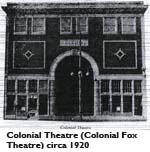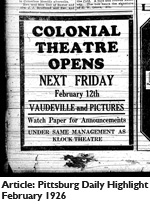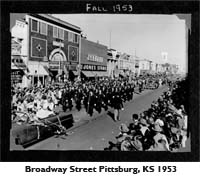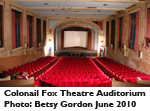
Mission and Vision
Programs & Events
Newsletter
Memories
Trustees
Staff
History at a Glance
History
|
History of the Colonial Fox Theatre
Even in these days of DVDs, cinema multi-plexes, and podcasts, a movie theatre evokes magic. That becomes much more the case when the magic of movies is combined with the magic of history, as it is in the Colonial Fox Theatre. Many local residents have fond memories of seeing films at the Colonial, and later at the Fox, Saturdays spent at the matinee, first dates, and special occasions.
The rich history of our theatre is part of the rich history of Pittsburg and the surrounding area. Pittsburg was incorporated in 1879 as the coal mining and smelting heart of the region. At the time, Southeast Kansas was the third largest producer of coal and smelt in the nation. Pittsburg is the largest city in Southeast Kansas, and is centrally located between Tulsa and Kansas City. Throughout its history, the theatre’s life reflected the life of the community. For example, old-timers say that the streets of Pittsburg once rang with the sound of more than 50 different languages. The 1920s saw the heyday of coal mining, and immigrants came from the Balkans region of Europe, Italy, Germany, the British Isles, and beyond, to work in the coal pits. This cultural diversity gave Pittsburg a unique flavor that made its way into every part of civic life. When the Colonial Theatre opened, it was one of the first movie palaces of its era to be a showplace accessible to all classes; eventually, it was open to all ethnic groups as well.
Like most theatres in the 1920s, the Colonial was designed by local architects in accordance to styles established in large cities. According to The Pittsburg Daily Headlight, the Colonial was "constructed along the same lines as the Isis in Kansas City."
 Although modeled after the Isis, the Pittsburg theatre was conceived, designed, owned, and operated locally. W.H. Daly, R.H. and G.E. Klock, and Alexander Besse founded the Pittsburg Amusement Company, which also operated the Mystic and Klock theatres in town. Besse, an influential local businessman, was a founding member of the company and wore such hats as president, treasurer, and general manager until his death in 1944. The 12-story Besse Hotel, currently slated for restoration, is another central landmark in Pittsburg, just down Fourth Street from the Colonial Fox. The hotel was named for Besse because of his role as the primary stockholder for the project. Asa Messenger, known as the area’s premier builder, was also a part owner of the Pittsburg Amusement Company, and added his skills to its creation when he served as general contractor and chief builder on the Colonial Theatre. Although the design is primarily in the popular Italian Renaissance Revival style, Messenger was obviously influenced by the American Arts and Crafts movement, and the building incorporates beaux arts details. He is noted for his work on other Pittsburg landmarks such as the Masonic Temple, the remodeling of the National Bank, and the building of Russ Hall at the State Manual Training Normal of Pittsburg, now Pittsburg State University. Although modeled after the Isis, the Pittsburg theatre was conceived, designed, owned, and operated locally. W.H. Daly, R.H. and G.E. Klock, and Alexander Besse founded the Pittsburg Amusement Company, which also operated the Mystic and Klock theatres in town. Besse, an influential local businessman, was a founding member of the company and wore such hats as president, treasurer, and general manager until his death in 1944. The 12-story Besse Hotel, currently slated for restoration, is another central landmark in Pittsburg, just down Fourth Street from the Colonial Fox. The hotel was named for Besse because of his role as the primary stockholder for the project. Asa Messenger, known as the area’s premier builder, was also a part owner of the Pittsburg Amusement Company, and added his skills to its creation when he served as general contractor and chief builder on the Colonial Theatre. Although the design is primarily in the popular Italian Renaissance Revival style, Messenger was obviously influenced by the American Arts and Crafts movement, and the building incorporates beaux arts details. He is noted for his work on other Pittsburg landmarks such as the Masonic Temple, the remodeling of the National Bank, and the building of Russ Hall at the State Manual Training Normal of Pittsburg, now Pittsburg State University.
In fact, all the Colonial's builders and craftsmen were from Pittsburg. The Pittsburg Boiler & Machine Company produced the thousand-pound steel girders that support the building’s roof. Lance White & Son Marble Works crafted the beautiful stonework, and Messenger’s company milled the woodwork. Harry A. Clark installed the plumbing while the Pittsburg Cornice Works installed the Wise Furnace. W.C. Wilson completed the metalwork for the theatre's ventilating and heating system, designing a "split air plan" which supplied fresh air to the projectionist’s booth while keeping film odors from the public. Borden-Brisbin Electrical Company installed the Colonial's eight and a half miles of wiring, 20,000 conduits, and a special dimming device on the auditorium lights. H.A. Smith decorated the Colonial with materials furnished by A.O. Wheeler, the city's "exclusive dealer" of Sherwin-Williams paints. The Colonial cost approximately $80,000, and Messenger's weekly payroll ran between $500 and $1,800.
The new theatre featured a portico entrance flanked by four shops, or "rooms," which opened both onto the street and into the portico. These rooms housed businesses such as Consumers’ Coffee Company, the Little Kitchenette, the Smoke Shop, and the Pittsburg Shoe Shining Parlor. W.H. Kelley’s barbershop and pool hall occupied the basement. Past the portico, the interior of the theatre consisted of a small inner lobby, a cavernous and boxy auditorium, and a basement with white subway tile adorning the walls. The 1,200 seat auditorium had no balcony, in part because of Besse’s “distinct aversion” to them. Instead, it provided stadium seating, in which the floor gradually slopes from the last row of seats to the stage. The theatre was originally decorated in tones of blue and white, with painted, semi-atmospheric, canvas murals on the walls of the auditorium.
When it opened, The Pittsburg Daily Headlight called it “the largest and most modern theatre in Southeast Kansas.” Two thousand people attended the premier, a screening of “Everywoman,” starring Violet Heming, Theodore Roberts, and Wanda Hawley. At least a thousand people had to be turned away. A six-piece orchestra, later advertised as “a regular everyday feature at the Colonial,” played a special opening night score. Within the first week, the Colonial established a permanent schedule, rotating movie screenings with vaudeville performances.
 In 1926, the Colonial briefly closed for "extensive exterior remodeling and complete redecorating inside." In addition to a new indirect lighting system, projection machine, carpeting, and drapes, the stage was expanded, providing an extra 10 feet in depth and covering the orchestra pit. The most significant aspect of the 1926 remodel was the creation of the interior foyer. The Pittsburg Daily Headlight reported, "The old lobby is being torn out completely and will be replaced with an extension of the theatre to the sidewalk with commodious foyer inside the building. A lounge for women is being installed. The ticket office will be at the edge of the sidewalk and will be fronted with an attractive illuminated marquise [sic]. A new 25-foot electric sign to be suspended over the sidewalk will be installed." Remodeling included "doing away with the present large dome entrance," moving the box office out to the street, and extending the facade. A false front in a combination of brick and metal covered the original store entrances and pilasters on the lower facade. In 1926, the Colonial briefly closed for "extensive exterior remodeling and complete redecorating inside." In addition to a new indirect lighting system, projection machine, carpeting, and drapes, the stage was expanded, providing an extra 10 feet in depth and covering the orchestra pit. The most significant aspect of the 1926 remodel was the creation of the interior foyer. The Pittsburg Daily Headlight reported, "The old lobby is being torn out completely and will be replaced with an extension of the theatre to the sidewalk with commodious foyer inside the building. A lounge for women is being installed. The ticket office will be at the edge of the sidewalk and will be fronted with an attractive illuminated marquise [sic]. A new 25-foot electric sign to be suspended over the sidewalk will be installed." Remodeling included "doing away with the present large dome entrance," moving the box office out to the street, and extending the facade. A false front in a combination of brick and metal covered the original store entrances and pilasters on the lower facade.
 During the remodeling in May 1926, the Colonial also shuffled its management. While the Pittsburg Amusement Company continued to own the properties, it leased the Colonial and Klock to the Midland Theatre Circuit of Kansas City. Midland operated theatres across Kansas in Wichita, Hutchinson, and Salina, and was building a Midland Theatre in Kansas City, Missouri, at 13th and Main. As part of the deal, the Klock underwent a more extensive renovation than the Colonial, which was overseen by the Boller Brothers, a prominent Kansas City theatre design firm. Upon completion, the Klock was reopened as the Midland Theatre. During the remodeling in May 1926, the Colonial also shuffled its management. While the Pittsburg Amusement Company continued to own the properties, it leased the Colonial and Klock to the Midland Theatre Circuit of Kansas City. Midland operated theatres across Kansas in Wichita, Hutchinson, and Salina, and was building a Midland Theatre in Kansas City, Missouri, at 13th and Main. As part of the deal, the Klock underwent a more extensive renovation than the Colonial, which was overseen by the Boller Brothers, a prominent Kansas City theatre design firm. Upon completion, the Klock was reopened as the Midland Theatre.
Sometime before 1944, the Pittsburg Amusement  Company leased the Midland and Colonial to the Fox Kansas Theatre Company. In 1958, the new operators created the metal and brick false fronts, and when, in 1959, the present art-deco Fox marquee, originally on the nearby Midland Theatre, replaced the 1926 marquee, the Colonial became know as the Fox Theatre. The Fox marquee was to be an "... exact duplicate of illuminated front extensions of modern show houses being built in larger cities ..." Operators hoped the remodeling would offer "a metropolitan theatrical aspect along Broadway." Once again, Asa Messenger undertook the $15,000 project, completing it in less than two weeks. Company leased the Midland and Colonial to the Fox Kansas Theatre Company. In 1958, the new operators created the metal and brick false fronts, and when, in 1959, the present art-deco Fox marquee, originally on the nearby Midland Theatre, replaced the 1926 marquee, the Colonial became know as the Fox Theatre. The Fox marquee was to be an "... exact duplicate of illuminated front extensions of modern show houses being built in larger cities ..." Operators hoped the remodeling would offer "a metropolitan theatrical aspect along Broadway." Once again, Asa Messenger undertook the $15,000 project, completing it in less than two weeks.
 Despite the 1959 alterations to the facade and the addition of the Fox marquee, the Colonial Fox Theatre maintains a high degree of architectural integrity on both the interior and exterior. Vacant since the mid-1980s, the interior, including the basement, has been altered little since the 1926 renovation. The arched entry in the outer lobby was extant under the suspended ceiling and, with the removal of the suspended ceiling, is visible for the first time since 1926. Likewise, it is highly probable that the two pillars and archway were merely covered by the reversible false front and will be able to be restored. Despite the 1959 alterations to the facade and the addition of the Fox marquee, the Colonial Fox Theatre maintains a high degree of architectural integrity on both the interior and exterior. Vacant since the mid-1980s, the interior, including the basement, has been altered little since the 1926 renovation. The arched entry in the outer lobby was extant under the suspended ceiling and, with the removal of the suspended ceiling, is visible for the first time since 1926. Likewise, it is highly probable that the two pillars and archway were merely covered by the reversible false front and will be able to be restored.
Today, the business space on the south remains and houses the office of the Colonial Fox Theatre Foundation, although with street entrance only. The shop space on the north was converted to the theatre’s office space in the 1960s and currently serves as a storage area.
Two groups have worked to restore the Colonial Fox. The Colonial Fox Theater, Inc., formed in September of 1999, was under the direction of Marsha A. Besse, granddaughter of Alexander Besse. Marsha Besse sold the building to the current Colonial Fox Theatre Foundation (CFTF) in 2007, after a successful campaign by the Colonial Fox Theatre Foundation to save the theatre from being sold at public auction and a certain fate of demolition.
Since the CFTF was founded in December of 2006 to purchase the building, the Colonial Fox Theatre has been accepted to the National Register of Historic Places (2008). It had previously been accepted to the Register of Historic Kansas Places in 2000 due to its significance as an architecturally designed movie palace reflecting small town sensibilities and for its historical association with the commercial and social development of Pittsburg.
 In addition, the renovation project has received grants from the Coleman FamilyFoundation, the Miller Family Foundation, four grants from the Besse-Spiva-Timmons Family Foundation, the Elliott Family Foundation, and Names and Numbers. Other awards have included $90,000 from the Pritchett Trust to help replace the building’s leaky roof, $90,000 from the Kansas Historic Society Heritage Trust Fund in 2008 and another $90,000 in 2010. The Kansas Arts Commission has presented two grants totaling $4,000, including one which helped fund the 2008 fall Festival on Broadway. The KansasPreservation Alliance awarded the CFTF the “Roll Up Your Sleeves” award, with its In addition, the renovation project has received grants from the Coleman FamilyFoundation, the Miller Family Foundation, four grants from the Besse-Spiva-Timmons Family Foundation, the Elliott Family Foundation, and Names and Numbers. Other awards have included $90,000 from the Pritchett Trust to help replace the building’s leaky roof, $90,000 from the Kansas Historic Society Heritage Trust Fund in 2008 and another $90,000 in 2010. The Kansas Arts Commission has presented two grants totaling $4,000, including one which helped fund the 2008 fall Festival on Broadway. The KansasPreservation Alliance awarded the CFTF the “Roll Up Your Sleeves” award, with its first-ever monetary award of $500. The Colonial Fox has been placed on the 2008 list of Kansas Preservation Alliance’s Most Endangered Properties list. In 2010 the Colonial Fox Theatre Foundation was awarded a $500,000 matching fund from the prestigious Save America’s Treasures Grant, which is administered by the United States National Park Service. For more information on how these funds are being utilized, visit our Progress Updates page. first-ever monetary award of $500. The Colonial Fox has been placed on the 2008 list of Kansas Preservation Alliance’s Most Endangered Properties list. In 2010 the Colonial Fox Theatre Foundation was awarded a $500,000 matching fund from the prestigious Save America’s Treasures Grant, which is administered by the United States National Park Service. For more information on how these funds are being utilized, visit our Progress Updates page.
Although the CFTF is proving successful at gaining grant support from local and national organizations, we rely on the help of everyday folks like you. For information on how you can help us restore the Colonial Fox Theatre to be an anchor for economic renewal of the region, vision our Support Us page.
Note: This article is based on information gathered by Joel Rhodes for the Colonial Fox Theatre’s National Registry nomination, with additional contributions by former Colonial Fox Theatre owner Marsha Besse and CFTF founding treasurer George Weeks. The original article appears as “Movie House History” at www.ReelDiaries.com.
|









|




 Although modeled after the Isis, the Pittsburg theatre was conceived, designed, owned, and operated locally. W.H. Daly, R.H. and G.E. Klock, and Alexander Besse founded the Pittsburg Amusement Company, which also operated the Mystic and Klock theatres in town. Besse, an influential local businessman, was a founding member of the company and wore such hats as president, treasurer, and general manager until his death in 1944. The 12-story Besse Hotel, currently slated for restoration, is another central landmark in Pittsburg, just down Fourth Street from the Colonial Fox. The hotel was named for Besse because of his role as the primary stockholder for the project. Asa Messenger, known as the area’s premier builder, was also a part owner of the Pittsburg Amusement Company, and added his skills to its creation when he served as general contractor and chief builder on the Colonial Theatre. Although the design is primarily in the popular Italian Renaissance Revival style, Messenger was obviously influenced by the American Arts and Crafts movement, and the building incorporates beaux arts details. He is noted for his work on other Pittsburg landmarks such as the Masonic Temple, the remodeling of the National Bank, and the building of Russ Hall at the State Manual Training Normal of Pittsburg, now Pittsburg State University.
Although modeled after the Isis, the Pittsburg theatre was conceived, designed, owned, and operated locally. W.H. Daly, R.H. and G.E. Klock, and Alexander Besse founded the Pittsburg Amusement Company, which also operated the Mystic and Klock theatres in town. Besse, an influential local businessman, was a founding member of the company and wore such hats as president, treasurer, and general manager until his death in 1944. The 12-story Besse Hotel, currently slated for restoration, is another central landmark in Pittsburg, just down Fourth Street from the Colonial Fox. The hotel was named for Besse because of his role as the primary stockholder for the project. Asa Messenger, known as the area’s premier builder, was also a part owner of the Pittsburg Amusement Company, and added his skills to its creation when he served as general contractor and chief builder on the Colonial Theatre. Although the design is primarily in the popular Italian Renaissance Revival style, Messenger was obviously influenced by the American Arts and Crafts movement, and the building incorporates beaux arts details. He is noted for his work on other Pittsburg landmarks such as the Masonic Temple, the remodeling of the National Bank, and the building of Russ Hall at the State Manual Training Normal of Pittsburg, now Pittsburg State University. In 1926, the Colonial briefly closed for "extensive exterior remodeling and complete redecorating inside." In addition to a new indirect lighting system, projection machine, carpeting, and drapes, the stage was expanded, providing an extra 10 feet in depth and covering the orchestra pit. The most significant aspect of the 1926 remodel was the creation of the interior foyer. The Pittsburg Daily Headlight reported, "The old lobby is being torn out completely and will be replaced with an extension of the theatre to the sidewalk with commodious foyer inside the building. A lounge for women is being installed. The ticket office will be at the edge of the sidewalk and will be fronted with an attractive illuminated marquise [sic]. A new 25-foot electric sign to be suspended over the sidewalk will be installed." Remodeling included "doing away with the present large dome entrance," moving the box office out to the street, and extending the facade. A false front in a combination of brick and metal covered the original store entrances and pilasters on the lower facade.
In 1926, the Colonial briefly closed for "extensive exterior remodeling and complete redecorating inside." In addition to a new indirect lighting system, projection machine, carpeting, and drapes, the stage was expanded, providing an extra 10 feet in depth and covering the orchestra pit. The most significant aspect of the 1926 remodel was the creation of the interior foyer. The Pittsburg Daily Headlight reported, "The old lobby is being torn out completely and will be replaced with an extension of the theatre to the sidewalk with commodious foyer inside the building. A lounge for women is being installed. The ticket office will be at the edge of the sidewalk and will be fronted with an attractive illuminated marquise [sic]. A new 25-foot electric sign to be suspended over the sidewalk will be installed." Remodeling included "doing away with the present large dome entrance," moving the box office out to the street, and extending the facade. A false front in a combination of brick and metal covered the original store entrances and pilasters on the lower facade. During the remodeling in May 1926, the Colonial also shuffled its management. While the Pittsburg Amusement Company continued to own the properties, it leased the Colonial and Klock to the Midland Theatre Circuit of Kansas City. Midland operated theatres across Kansas in Wichita, Hutchinson, and Salina, and was building a Midland Theatre in Kansas City, Missouri, at 13th and Main. As part of the deal, the Klock underwent a more extensive renovation than the Colonial, which was overseen by the Boller Brothers, a prominent Kansas City theatre design firm. Upon completion, the Klock was reopened as the Midland Theatre.
During the remodeling in May 1926, the Colonial also shuffled its management. While the Pittsburg Amusement Company continued to own the properties, it leased the Colonial and Klock to the Midland Theatre Circuit of Kansas City. Midland operated theatres across Kansas in Wichita, Hutchinson, and Salina, and was building a Midland Theatre in Kansas City, Missouri, at 13th and Main. As part of the deal, the Klock underwent a more extensive renovation than the Colonial, which was overseen by the Boller Brothers, a prominent Kansas City theatre design firm. Upon completion, the Klock was reopened as the Midland Theatre. Company leased the Midland and Colonial to the Fox Kansas Theatre Company. In 1958, the new operators created the metal and brick false fronts, and when, in 1959, the present art-deco Fox marquee, originally on the nearby Midland Theatre, replaced the 1926 marquee, the Colonial became know as the Fox Theatre. The Fox marquee was to be an "... exact duplicate of illuminated front extensions of modern show houses being built in larger cities ..." Operators hoped the remodeling would offer "a metropolitan theatrical aspect along Broadway." Once again, Asa Messenger undertook the $15,000 project, completing it in less than two weeks.
Company leased the Midland and Colonial to the Fox Kansas Theatre Company. In 1958, the new operators created the metal and brick false fronts, and when, in 1959, the present art-deco Fox marquee, originally on the nearby Midland Theatre, replaced the 1926 marquee, the Colonial became know as the Fox Theatre. The Fox marquee was to be an "... exact duplicate of illuminated front extensions of modern show houses being built in larger cities ..." Operators hoped the remodeling would offer "a metropolitan theatrical aspect along Broadway." Once again, Asa Messenger undertook the $15,000 project, completing it in less than two weeks. Despite the 1959 alterations to the facade and the addition of the Fox marquee, the Colonial Fox Theatre maintains a high degree of architectural integrity on both the interior and exterior. Vacant since the mid-1980s, the interior, including the basement, has been altered little since the 1926 renovation. The arched entry in the outer lobby was extant under the suspended ceiling and, with the removal of the suspended ceiling, is visible for the first time since 1926. Likewise, it is highly probable that the two pillars and archway were merely covered by the reversible false front and will be able to be restored.
Despite the 1959 alterations to the facade and the addition of the Fox marquee, the Colonial Fox Theatre maintains a high degree of architectural integrity on both the interior and exterior. Vacant since the mid-1980s, the interior, including the basement, has been altered little since the 1926 renovation. The arched entry in the outer lobby was extant under the suspended ceiling and, with the removal of the suspended ceiling, is visible for the first time since 1926. Likewise, it is highly probable that the two pillars and archway were merely covered by the reversible false front and will be able to be restored. In addition, the renovation project has received grants from the Coleman FamilyFoundation, the Miller Family Foundation, four grants from the Besse-Spiva-Timmons Family Foundation, the Elliott Family Foundation, and Names and Numbers. Other awards have included $90,000 from the Pritchett Trust to help replace the building’s leaky roof, $90,000 from the Kansas Historic Society Heritage Trust Fund in 2008 and another $90,000 in 2010. The Kansas Arts Commission has presented two grants totaling $4,000, including one which helped fund the 2008 fall Festival on Broadway. The KansasPreservation Alliance awarded the CFTF the “Roll Up Your Sleeves” award, with its
In addition, the renovation project has received grants from the Coleman FamilyFoundation, the Miller Family Foundation, four grants from the Besse-Spiva-Timmons Family Foundation, the Elliott Family Foundation, and Names and Numbers. Other awards have included $90,000 from the Pritchett Trust to help replace the building’s leaky roof, $90,000 from the Kansas Historic Society Heritage Trust Fund in 2008 and another $90,000 in 2010. The Kansas Arts Commission has presented two grants totaling $4,000, including one which helped fund the 2008 fall Festival on Broadway. The KansasPreservation Alliance awarded the CFTF the “Roll Up Your Sleeves” award, with its first-ever monetary award of $500. The Colonial Fox has been placed on the 2008 list of Kansas Preservation Alliance’s Most Endangered Properties list. In 2010 the Colonial Fox Theatre Foundation was awarded a $500,000 matching fund from the prestigious Save America’s Treasures Grant, which is administered by the United States National Park Service. For more information on how these funds are being utilized, visit our
first-ever monetary award of $500. The Colonial Fox has been placed on the 2008 list of Kansas Preservation Alliance’s Most Endangered Properties list. In 2010 the Colonial Fox Theatre Foundation was awarded a $500,000 matching fund from the prestigious Save America’s Treasures Grant, which is administered by the United States National Park Service. For more information on how these funds are being utilized, visit our 

